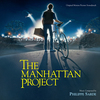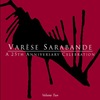Soundtrack Information

Sister Mary Explains It All
Varese Sarabande (302 066 268 2)
Release Date: 2001
Conducted by David Snell
Format: CD
Music By
Purchase Soundtrack
Track Listing
Related Albums

The Manhattan ProjectLimited Edition
Varese Sarabande Club (VCL-0310-1107)Released: March 15, 2010
Format: CD (33 min)

Varese Sarabande - 25th Anniversary Celebration - Volume IILimited Edition
Varese Sarabande Club (VCL 0703 1021)Released: July 29, 2003
Format: CD (306 min)
Review: Sister Mary Explains It All
3 / 5 Stars
Christopher Durang's controversial play "Sister Mary Explains It All" was adapted into a Showtime original movie, starring Diane Keaton in the title role. Directed by Marshall Brickman, the play focuses on Sister Mary, a nun who is holding her annual lecture with a bunch of former Catholic students in attendance. Dysfunctional to the core, they all plan to confront and embarrass Sister Mary. The score by Brickman collaborator Philippe Sarde is one of three Brickman scores presented on this compilation album.
For Sister Mary Explains It All, Sarde takes the dramatic religious approach, with a chorus and orchestral. "Praise My Soul (Main Titles)" is a tender moving choral that fits perfectly in a church setting. The main theme heard in that track weaves its way through the entire score, with a soft dramatic edge in "Preparations" and a more pronounced rendition in "Praise My Soul (Reprise)". "The Serpent" is a colder track that actually evokes a slinky, winding motion - for almost six minutes it builds uncomfortably, which is exactly what it was supposed to do. "Innocence" is lighter and orchestrated a bit thinner - it feels a bit sparse. "Escape" is another choral track, reminding us that religion is quite near. "Redemption / End Titles" recaps most of the score, and I would say that this last track, in addition to the first track, is one of the best ones to listen to from this score.
Another film score included on this album is from Lovesick. This Dudley Moore film was about a psychiatrist who falls in love with a patient - and is visited by Freud himself to give advice on how to handle it. Sarde's score to this film is sweet and romantic. "Main Theme" is a great six-minute track that is heavy on the strings, while being both tender and romantic. The score comes close to being cliché at times, especially when the sweeping strings start to soar, and the flute takes over. (Honestly, how many times have we heard that approached used in romantic comedies?) Given that Freud figures heavily into the film, it comes as no surprise that there are plenty of waltzes. "Freudian Waltz" is a rather upbeat dance that has a Viennese edge to it, replete with accordion and solo violin. Another cue evoking dancing, including flourishes, is "Obsession in 3/4 Time". "Saul's Nightmare" doesn't seem frightful; it's a rather upbeat piece for the most part, comprised mainly of piano, violin, and accordion, with the occasional woodwind supplement. It ends with a big minor flourish, and was one of the more enjoyable cues from this score.
Finally, the last score presented on the album is from the taut thriller/comedy, The Manhattan Project. The film is about an overly-smart high-school student who builds an atomic bomb - and enters it into a science fair. Parts of this score are rather light, which feels odd because the "Main Title" and "Escape" are replete with tense moments. But this is a comedy at heart, and the score reflects that in its upbeat, almost playful cues. "Plutonium" is chipper and bright; "Night / Love Theme" is soft and tender. "Resolution / End Title" is somewhat lush, and ends on a happy note - there doesn't seem to be much tension in this score!
Since the 1970s, Philippe Sarde has scored over 170 projects - a rather impressive tally, to be sure. Only three of those films have been with director Marshall Brickman, and it's nice to have them assembled on one soundtrack. Sister Mary Explains It All was a good choral religious score, Lovesick a good romantic comedy score, and The Manhattan Project a light comedic "thriller" with heart. As a listening experience, this album is pretty good. The music flows through all three scores pretty well, and you can tell there are certain stylistic similarities in all of them. But in the end, I didn't feel that this was an album to keep coming back to. There were parts of each score that I enjoyed, but not enough to keep coming back to. For people willing to try something new (if they haven't heard Sarde's work before), I'd definitely recommend checking it out.
-
Click stars
to rate.
If any information appears to be missing from this page, contact us and let us know!